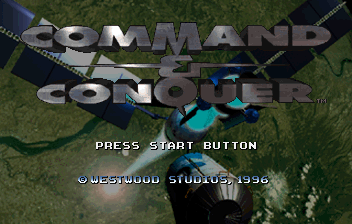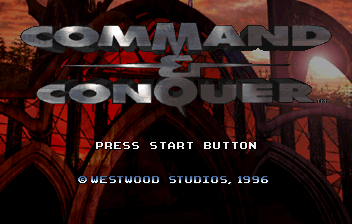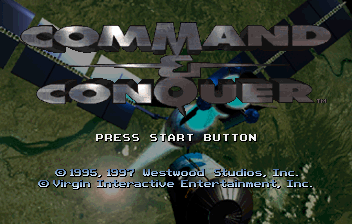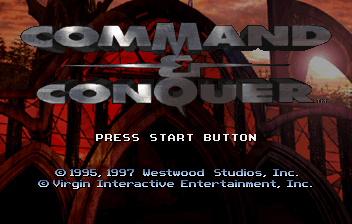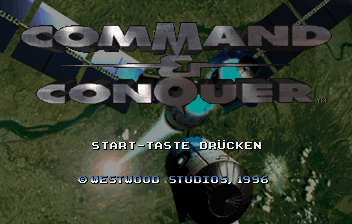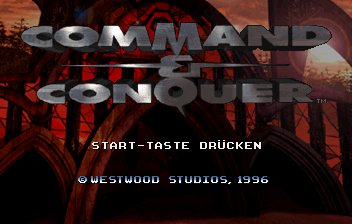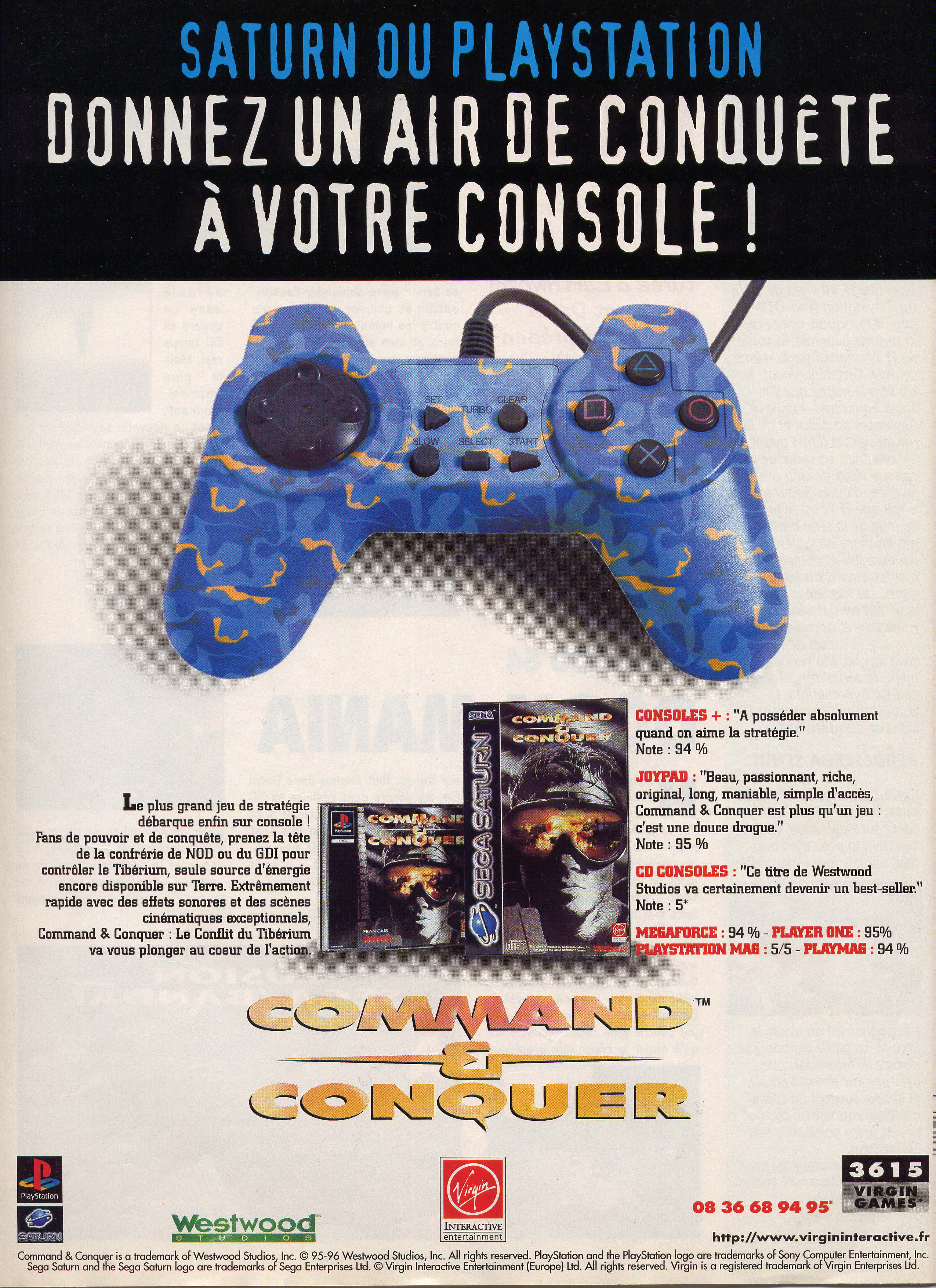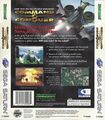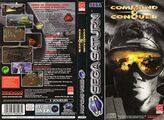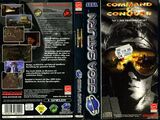Command & Conquer
From Sega Retro
- For the unlicensed Sega Mega Drive game, see Command & Conquer (Mega Drive).
| ||||||||||||||||||||||||||||||||||||||||||||||||||||||||||||
| Command & Conquer | ||||||||||||||||||||||||||||||||||||||||||||||||||||||||||||
|---|---|---|---|---|---|---|---|---|---|---|---|---|---|---|---|---|---|---|---|---|---|---|---|---|---|---|---|---|---|---|---|---|---|---|---|---|---|---|---|---|---|---|---|---|---|---|---|---|---|---|---|---|---|---|---|---|---|---|---|---|
| System(s): Sega Saturn | ||||||||||||||||||||||||||||||||||||||||||||||||||||||||||||
| Publisher: Virgin Interactive Entertainment (US, Europe), Sega (Japan) | ||||||||||||||||||||||||||||||||||||||||||||||||||||||||||||
| Developer: Westwood Studios | ||||||||||||||||||||||||||||||||||||||||||||||||||||||||||||
| Sound driver: SCSP/CD-DA (11/15 tracks) | ||||||||||||||||||||||||||||||||||||||||||||||||||||||||||||
| Genre: Realtime Strategy Simulation/Realtime Senryaku Simulation (リアルタイム 戦略シミュレーション)[1], Simulation[2] | ||||||||||||||||||||||||||||||||||||||||||||||||||||||||||||
| Number of players: 1 | ||||||||||||||||||||||||||||||||||||||||||||||||||||||||||||
| Official in-game languages: | ||||||||||||||||||||||||||||||||||||||||||||||||||||||||||||
| ||||||||||||||||||||||||||||||||||||||||||||||||||||||||||||
|
Command & Conquer (コマンド&コンカー) is a real time strategy game developed by Westwood Studios and published by Virgin Interactive Entertainment for IBM compatible computers running DOS in August 1995. It is the first in the Command & Conquer franchise and is considered a milestone in the genre, influencing many RTS games in the years which followed.
The game's success saw it ported to the Sega Saturn, where Sega signed a deal to make it a Saturn exclusive until 1997[7] (though as a late 1996 release, this "exclusivity" amounted to just under three months). Command & Conquer is frequently referred to as Tiberian Dawn by fans and is subtitled in Germany with Teil 1 Der Tiberiumkonflikt.
Contents
Plot
Command & Conquer takes place in an alternative universe, shortly after a mysterious alien substance crashes on Earth near the river Tiber in Italy at some point in 1995. This substance, henceforth known as "Tiberium", becomes an extremely valuable commodity, which despite its toxic nature, is able to absorb and crystallize precious metals from the surrounding soil. A secret society known as the Brotherhood of Nod, spearheaded by a self-proclaimed messiah known only as "Kane", claims to have foreseen the arrival of Tiberium and has great plans for its future, soon controlling over half the supply and using the funds to amass an army of followers.
Following a succession of terrorist incidents blamed on the Brootherhood, the United Nations Security Council authorizes the creation and deployment of the United Nations' Global Defense Initiative (GDI) to intervene against Kane and Nod, quickly escalating into a conflict which spans the globe (and is later referred to as the "first tiberium war").
The player, who is nameless and does not speak, can choose to conduct missions on behalf of GDI or Nod (each as its own disc), building bases and ordering troops, usually to destroy enemy factions and spread influence over countries. GDI's campaign takes place mainly in Europe, while Nod is more concerned with Africa.
Gameplay
Command & Conquer is an evolution of the gameplay seen in Westwood's earlier work, Dune II, in which the goal usually involves building a base and destroying all enemy units or structures on a map (although missions are generally more varied than Dune II). Command & Conquer introduces support for selecting multiple units at once, has a single unified menu for construction of buildings and training of units, and has a more varied selection of said units, including engineers for capturing structures and airbourne helicopters.
Similarly to Dune II, the player must manage resources such as power (generated from power plants) and tiberium, replacing spice as a resource harvested from select points on the map. Later in the game superweapons are introduced, such as GDI's signature Ion Cannon, which can devestate large areas in one click. The cap on the number of units allowed in-game is much higher, to point where it isn't noticed, although hundreds of units on screen can invariably affect the frame rate.
Structures
Both sides
| Construction yard | |
|---|---|
| Typically the most important structure in the game, the construction yard allows a commander to build structures and therefore create a base. | |
| Sandbags | |
|
Cost: $50 Power: 0 | |
| Simple base defenses that can block infantry, but can be crushed by heavy vehicles and destroyed by explosive weapons. | |
| Chain link fence | |
|
Cost: $75 Power: 0 | |
| Slightly sturdier base defenses that behave similarly to sandbags, but take slightly longer to destroy. | |
| Concrete wall | |
|
Cost: $100 Power: 0 | |
| Defenses that can only be destroyed with explosives. | |
| Power plant | |
|
Cost: $300 Power: +100 | |
| Provides power to the commander's base. While able to output a maximum of 100 units of power, the amount is dictated by the health of the structure; the more damaged the power plant is, the less power it will produce. | |
| Advaned power plant | |
|
Cost: $700 Power: +200 | |
| A more efficient form of the power plant, this time being able to output a maximum of 200 units of power. | |
| Repair facility | |
|
Cost: $1,200 Power: -30 | |
| A means of repairing damaged vehicles. If a unit is ordered into a repair facility, it will be repaired as long as the commander has enough funds. | |
| Helipad | |
|
Cost: $1,500 Power: -10 | |
| A means of producing helicopters. Helipads also acts as a re-arming station for friendly helicopters (though when this is occuring, new helicopters cannot be produced). The more helipads that exist, the faster helicopters will be produced.
Strictly speaking, Nod commanders cannot build helipads in Command & Conquer without capturing a GDI construction yard first, however the structure was clearly designed with Nod in mind, as it will grant Nod commanders the Apache unit instead of the ORCA. If captured while a helicopter is re-arming, the helicopter will be captured too. | |
| Tiberium refinery | |
|
Cost: $2,000 Power: -30 | |
| The primary means of generating funds, a refinery always comes with one harvester, which will go out, harvest tiberium and return to the refinery for processing. Any friendly harvester can use a refinery, and will queue up if the structure is occupied.
The refinery will also store up to 1,000 units of tiberium for later use. If the structure is captured, the value of this tiberium will be deducted from the commander's account, and if captured while a harvester is unloading, the harvester will be captured too. | |
| Tiberium silo | |
|
Cost: $150 Power: -10 | |
| Structures for storing 1,500 units of excess tiberium for later use. Similarly to the refinery, if captured the value of this tiberium be deducted from the commander's account. | |
| Communications center | |
|
Cost: $1,000 Power: -40 | |
| Provides a radar of the battlefield, giving the commander a clearer overview of the play area. In a low power situation, the radar goes off. |
GDI
| Barracks | |
|---|---|
|
Cost: $300 Power: -20 | |
| GDI's structure for producing infantry. The more barracks that exist, the faster infantry will be produced. | |
| Guard tower | |
|
Cost: $500 Power: -10 | |
| Defensive towers armed with machineguns that can quickly take out infantry and weak vehicles at short range. Guard towers will continue to function without power. | |
| Weapons factory | |
|
Cost: $2,000 Power: -30 | |
| GDI's structure for producing ground vehicles. The more weapons factories that exist, the faster vehicles will be produced. | |
| Advanced communications center | |
|
Cost: $2,800 Power: -200 | |
| A variant of the communications center that provides access to GDI's super weapon, the Ion Cannon. If a standard communications center does not exist, this will also provide radar. In a low power situation both the radar and Ion Cannon charging will stop. | |
| Advanced guard tower | |
|
Cost: $1,000 Power: -20 | |
| More powerful defensive towers that can attack both ground and air units at a greater range. Advanced guard towers will not work without power, however. |
Nod
| Hand of Nod | |
|---|---|
|
Cost: $300 Power: -20 | |
| Nod's structure for producing infantry. The more hands of Nod that exist, the faster infantry will be produced. | |
| Turret | |
|
Cost: $600 Power: -20 | |
| Base defenses that can do damage to heavy vehicles but require power to operate. | |
| Airstrip | |
|
Cost: $2,000 Power: -30 | |
| Nod's structure for producing ground vehicles. The more hands of Nod that exist, the faster vehicles will be produced. Unlike GDI's weapons factory, Nod units only arrive on the battlefield when an (automatically controlled) aircraft lands, meaning there can be a delay between construction of the unit finishing and it actually being controllable. | |
| Temple of Nod | |
|
Cost: $3,000 Power: -150 | |
| A structure that gives Nod commanders access to the faction's super weapon, the nuclear missile. In a low power situation, "charging" the nuclear missle stops. | |
| SAM site | |
|
Cost: $750 Power: -20 | |
| Base defenses for attacking aircraft. If an aircraft is in range, the SAM site will emerge from underground, however this makes it more vulnerable to ground attacks. SAM sites require power to function. | |
| Obelisk of light | |
|
Cost: $1,500 Power: -150 | |
| Nod's ultimate base defense, which after charging fires a high power laser at ground units within range. It is the most powerful base defense in the game, but also the most power hungry. |
Units
Both
| Minigunner | |
|---|---|
|
Cost: $100 | |
| The most basic and weakest of trainable infantry, commonly used for scouting or as a last resort. When structures are sold, minigunners are often left behind. | |
| Rocket soldier | |
|
Cost: $300 | |
| Slower units effective against armour and airboune units. | |
| Engineer | |
|
Cost: $500 | |
| Units which can capture enemy structures or repair friendly ones in one go without additional charge. In this original Command & Conquer, engineers cannot capture base defenses. | |
| Commando | |
|
Cost: $1,000 | |
| Quick firing, long range units which specialise in taking out infrantry. They can also blow up structures instantly with C4 explosives. | |
| Mobile construction vehicle | |
|
Cost: $5,000 | |
| An unarmed vehicle that can be deployed, creating a construction yard. | |
| Harvester | |
|
Cost: $1,400 | |
| Unarmed units which harvest tiberium and make the commander money. Harvesters will slowly return to 50% health after being attacked. | |
| Armoured personnel carrier (APC) | |
|
Cost: $700 | |
| Ground vehicles which can transport up to five infantry units across the battlefield. Nod commanders cannot produce APCs, but are given some to control in the campaign. | |
| Chinook | |
|
Cost: $1,500 | |
| Unarmed helicopters that can transport up to five infantry units across the battlefield. | |
| Hovercraft | |
| A heavily armoured amphibious unit that deploys vehicles and infantry into battle. Hovercrafts cannot be built or controlled by the commander, and only appear in certain campaign missions. | |
| Technician | |
| The weakest unit in the game that cannot be built explicitly, only appearing as controllable units when certain structures are sold. Technicans are armed with light pistols that do minimal damage, are easily killed, and can be temporarily scared, running uncontrollably around in a small area.
Civilians found across the campaign have similar traits but are not directly controllable. |
GDI
| Grenadier | |
|---|---|
|
Cost: $160 | |
| Infantry units armed with grenades, that are more effective than standard minigunners. Grenades can be thrown over walls. | |
| Humvee | |
|
Cost: $400 | |
| GDI's low-cost lightly armoured vehicle capable dispatching infantry. Incapable of crushing infantry, sandbags or chain link fences. | |
| Medium tank | |
|
Cost: $800 | |
| Tanks armed with armour-piercing shells that are effective against vehicles and structures. | |
| Rocket launcher | |
|
Cost: $800 | |
| Long range units that are effective against both ground and air targets from long range. They have no short-range weapons however, and are comparitively weak to other units. | |
| Mammoth tank | |
|
Cost: $1,500 | |
| The strongest unit in the game, GDI's mammoth tank is effective against everything, but is slow. It will also regenerate up to 50% of its health after being attacked. | |
| ORCA | |
|
Cost: $1,200 | |
| Vertical take-off and landing craft that fire up to five rockets. Effective against vehicles and structures, but must refuel at a helipad once its ammunition runs out. | |
| Gunboat | |
| Surface-to-surface missile launching boats that exist in the campaign, but cannot be built or controlled by the commander. |
Nod
| Flamethrower | |
|---|---|
|
Cost: $200 | |
| Fire-producing units that are very effective at close range. They are, however, capable of setting friendly units on fire, and explode violently when killed. | |
| Chemical warrior | |
|
Cost: $300 | |
| Infantry which produce short-lived toxic clouds of tiberium gas, almost instantly killing any enemy infantry. They are also immune to the effects of tiberium. | |
| Buggy | |
|
Cost: $300 | |
| Nod's low-cost lightly armoured vehicle capable dispatching infantry. Incapable of crushing infantry, sandbags or chain link fences. | |
| Recon bike | |
|
Cost: $500 | |
| Fast, lightly armoured rocket-launching bikes which are effective against vehicles, aircraft and structures. | |
| Light tank | |
|
Cost: $700 | |
| The fastest, but also weakest tanks in game which are effective against vehicles and structures. | |
| Artillery | |
|
Cost: $450 | |
| Long range cannons that can cause massive damage at the expense of being slow and lightly armoured. | |
| Flame tank | |
|
Cost: $800 | |
| Faster and stronger vehicle versions of the flamethrower. | |
| Stealth tank | |
|
Cost: $900 | |
| Cloaked units which are effective against vehicles, aircraft and structures but are again lightly armoured. The cloaking technology is temperamental, deactivating when the unit fires, or if too close to enemy infantry or base defenses.
If a stealth tank is critically damaged, the cloaking technology will cease to function. | |
| SSM launcher | |
|
Cost: $750 | |
| The longest ranged unit in the game, SSM launchers fire napalm rounds which are effective against everything. In the original Command & Conquer, this unit was reserved for multiplayer and AI opponents in the campaign. This means it cannot be built by the player in the Saturn version of the game. | |
| Apache | |
|
Cost: $1,200 | |
| Fast helicopters with plenty of firepower, but lightly armoured and only effective against infantry. |
Others
| Visceroid | |
|---|---|
| Creatures created by tiberium mutation, which may attack nearby units and structures by emitting tiberium gas. Visceroids only appear when infantry are killed by tiberium; there is a small chance the unit will mutate and begin attacking nearby objects. Visceroids use tiberium fields to regenerate health and are never directly controllable by commanders during normal play. |
Levels
GDI
| 1 | |
|---|---|
| 2 | |
| 3 | |
| 4 | |
| 5 | |
| 6 | |
| 7 | |
| 8 | |
| 9 | |
| 10 | |
| 11 | |
| 12 | |
| 13 | |
| 14 | |
| 15 | |
Nod
| 1 | |
|---|---|
| 2 | |
| 3 | |
| 4 | |
| 5 | |
| 6 | |
| 7 | |
| 8 | |
| 9 | |
| 10 | |
| 11 | |
| 12 | |
| 13 | |
| 14 | |
| 15 | |
History
Legacy
Command & Conquer is thought to have been reasonably successful on the Sega Saturn, as it qualified for the Satakore range in Japan (where it was published by Sega themselves) and was at one point bundled with consoles in Europe. It has since been superseded by superior versions - a Macintosh port released around the same period in 1996 which offers higher resolution graphics and official support for online play. These features were eventually ported to a Windows 95 version released in 1997. The final port of Command & Conquer was released in 1999 for the Nintendo 64. This version features 3D graphics, but has missing content.
Tomsoft attempted an unlicensed port to the Sega Mega Drive, but gave up early on and released his horribly incomplete beta. Because he failed to remove the copyright from the title screen, this has sometimes considered an official beta — but a look at the header (crediting his SDK) proves otherwise.
Command & Conquer was followed by Command & Conquer: Red Alert, set in the cold war era of the 1950s/60s, however the Tiberium storyline would receive a direct sequel in the form of Command & Conquer: Tiberian Sun, which introduced isometric graphics (although cameos and nods to the future mean Red Alert is technically a prequel also). No future Command & Conquer games were released on Sega systems, though the series has largely avoided consoles entirely (save for PlayStation ports of Red Alert and some expansions, and the Xbox 360 port of Command & Conquer 3: Tiberium Wars).
Versions
The Sega Saturn version of Command & Conquer derives from the DOS original, being the most accurate console port of the game. There is no support for the Shuttle Mouse meaning the controls are considered to be more cumbersome than computer versions, and the resolution is fixed at 352x224. Some other changes were made for unknown reasons, such as the inclusion of wider bridges. Unit shadows are also missing, and the user interface features horizontally-scrolling menus as opposed to the vertical ones seen in the DOS version.
Its PlayStation counterpart is reportedly built off the Saturn's code, with slightly higher resolution (and more complete) cutscenes in comparison. Unlike the Saturn, the PlayStation version is known to suffer from noticeable slowdown when many units are on-screen, but is at an advantage for including extra missions (sourced from The Covert Operations - an official expansion pack for Command & Conquer). The Saturn version retains more of the original soundtrack and sound effects, however.
Production credits
- Producer: Steve Wetherill
- Asst. Producer: Ed Del Castillo
- Original Concept: Joe Bostic, Brett W. Sperry
- Programmers: Greg Hjelstrom, Jonathan Lanier
- Technical Direction: Eric Wang
- Designer: Erik Yeo
- Artists: Joseph B. Hewitt IV, Matthew Hansel, Damon Redmond
- Screenplay: Ron Smith
- Audio Direction: Paul S. Mudra
- Soundtrack: Frank Klepacki
- Sound Effects: Dwight K. Okahara
- Qa Direction: Glenn Sperry
- Quality Assurance: Kenny Dunne, Chris Rubyor, Randy Greenback, Phillip Castro, John Archer, D'Andre Campbell, Chris Blevins, James Hughes, Levi Luke, Errol Campbell, Abe Hernandez, James Adkins, Richard Rasmussen, Ben Lublin, Chris Holloway, Isaiah Myers, Lloyd Bell, Mike Smith, Albert Springfield, Steve Corcoran, Tyler Thackery, Marcus Cobb, Chad Shackelford, Troy Leonard
- Manual Design: Penina Finger
Magazine articles
- Main article: Command & Conquer/Magazine articles.
Promotional material
also published in:
- Ultra Game Players (US) #93: "January 1997" (1996-12-31)[8]
- Electronic Gaming Monthly (US) #91: "February 1997" (199x-xx-xx)[9]
- Electronic Gaming Monthly (US) #92: "March 1997" (1997-0x-xx)[10]
- GameFan (US) #0504: "Volume 5, Issue 4: April 1997" (1997-xx-xx)[11]
also published in:
- Sega Saturn Magazine (UK) #15: "January 1997" (1996-12-17)[12]
also published in:
- Computer & Video Games (UK) #183: "February 1997" (1997-01-10)[13]
- Sega Saturn Magazine (UK) #17: "March 1997" (1997-02-19)[14]
Physical scans
| Sega Retro Average | ||||||||||||||||||||||||||||||||||||||||||||||||||||||||||||||||||||||||||||||||||||||||||||||||||||||||||||||||||||||||||||||||||||||||||||||||||||||||||||||||||||
|---|---|---|---|---|---|---|---|---|---|---|---|---|---|---|---|---|---|---|---|---|---|---|---|---|---|---|---|---|---|---|---|---|---|---|---|---|---|---|---|---|---|---|---|---|---|---|---|---|---|---|---|---|---|---|---|---|---|---|---|---|---|---|---|---|---|---|---|---|---|---|---|---|---|---|---|---|---|---|---|---|---|---|---|---|---|---|---|---|---|---|---|---|---|---|---|---|---|---|---|---|---|---|---|---|---|---|---|---|---|---|---|---|---|---|---|---|---|---|---|---|---|---|---|---|---|---|---|---|---|---|---|---|---|---|---|---|---|---|---|---|---|---|---|---|---|---|---|---|---|---|---|---|---|---|---|---|---|---|---|---|---|---|---|---|
|
| 87 | |
|---|---|
| Based on 32 reviews | |
| Saturn, JP (Satakore) |
|---|
| Saturn, PT |
|---|
|
Technical information
- Main article: Command & Conquer/Technical information.
References
- ↑ File:CommandandConquer Saturn JP Box Back.jpg
- ↑ 2.0 2.1 https://sega.jp/history/hard/segasaturn/software.html (Wayback Machine: 2020-03-04 08:13)
- ↑ http://riehlspot.simplenet.com/vgame/new/saturn.html (Wayback Machine: 1999-02-21 17:22)
- ↑ Computer & Video Games, "January 1997" (UK; 1996-12-11), page 53
- ↑ 5.0 5.1 Computer & Video Games, "January 1997" (UK; 1996-12-11), page 54
- ↑ Sega Magazin, "November 1996" (DE; 1996-10-09), page 27
- ↑ Maximum, "May 1996" (UK; 1996-05-30), page 73
- ↑ Ultra Game Players, "January 1997" (US; 1996-12-31), page 84
- ↑ Electronic Gaming Monthly, "February 1997" (US; 199x-xx-xx), page 119
- ↑ Electronic Gaming Monthly, "March 1997" (US; 1997-0x-xx), page 39
- ↑ GameFan, "Volume 5, Issue 4: April 1997" (US; 1997-xx-xx), page 59
- ↑ Sega Saturn Magazine, "January 1997" (UK; 1996-12-17), page 31
- ↑ Computer & Video Games, "February 1997" (UK; 1997-01-10), page 31
- ↑ Sega Saturn Magazine, "March 1997" (UK; 1997-02-19), page 100
- ↑ 576 KByte, "Február 1997" (HU; 1997-xx-xx), page 10
- ↑ Ação Games, "Março 1997" (BR; 1997-xx-xx), page 9
- ↑ Ação Games, "Maio 1997" (BR; 1997-xx-xx), page 22
- ↑ Consoles +, "Janvier 1997" (FR; 199x-xx-xx), page 140
- ↑ Electronic Gaming Monthly, "February 1997" (US; 199x-xx-xx), page 56
- ↑ Famitsu, "1997-05-02" (JP; 1997-04-18), page 1
- ↑ Fun Generation, "01/97" (DE; 1996-12-18), page 104
- ↑ Gambler, "3/1997" (PL; 1997-xx-xx), page 1
- ↑ Game Power, "Gennaio 1997" (IT; 199x-xx-xx), page 45
- ↑ GamePro, "March 1997" (US; 1997-xx-xx), page 86
- ↑ Game Informer, "March 1997" (US; 1997-0x-xx), page 41
- ↑ Joypad, "Décembre 1996" (FR; 1996-1x-xx), page 104
- ↑ Kiber Zona, "Spalis/Lapkritis 1997" (LT; 1997-xx-xx), page 3
- ↑ LeveL, "Leden 1997" (CZ; 1997-01-05), page 87
- ↑ MAN!AC, "01/97" (DE; 1996-12-11), page 68
- ↑ Mega Force, "Janvier/Février 1997" (FR; 199x-xx-xx), page 40
- ↑ Mega Fun, "01/97" (DE; 1996-12-11), page 36
- ↑ Mean Machines Sega, "January 1997" (UK; 1996-12-06), page 58
- ↑ Next Generation, "May 1997" (US; 1997-04-15), page 152
- ↑ Player One, "Décembre 1996" (FR; 1996-xx-xx), page 92
- ↑ Saturn Fan, "1997 No. 12" (JP; 1997-06-xx), page 90
- ↑ Saturn+, "Issue 6" (UK; 1997-02-27), page 5
- ↑ Secret Service, "Marzec 1997" (PL; 1997-xx-xx), page 66
- ↑ Sega Power, "Christmas 1996" (UK; 1996-11-21), page 38
- ↑ Sega Saturn Magazine, "January 1997" (UK; 1996-12-17), page 72
- ↑ Sega Saturn Magazine, "1997-13 (1997-04-25)" (JP; 1997-04-11), page 141
- ↑ Sega Saturn Magazine, "Readers rating final data" (JP; 2000-03), page 11
- ↑ Total Saturn, "Volume One Issue Three" (UK; 1996-11-29), page 34
- ↑ Total Saturn, "Volume One Issue Four" (UK; 1996-12-29), page 19
- ↑ Ultra Game Players, "April 1997" (US; 1997-03-25), page 82
- ↑ Video Games, "1/97" (DE; 1996-12-18), page 102
| Command & Conquer | |
|---|---|
|
Main page | Comparisons | Hidden content | Magazine articles | Reception | Technical information | Bootlegs | |
- 1 player games
- JP Saturn games
- All JP games
- US Saturn games
- All US games
- EU Saturn games
- All EU games
- DE Saturn games
- All DE games
- FR Saturn games
- All FR games
- PT Saturn games
- All PT games
- UK Saturn games
- All UK games
- PL Saturn games
- All PL games
- AU Saturn games
- All AU games
- BR Saturn games
- All BR games
- Saturn games
- 1996 Saturn games
- All 1996 games
- Saturn simulation games
- All simulation games
- All games
- Credits without reference
- Old-style rating (gamesmaster)
- Rating without PDF source
- Update ratings template
- 1 old ratings
- Command & Conquer
